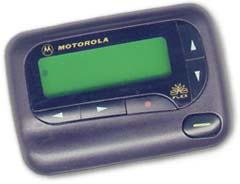An ongoing dialogue on HIV/AIDS, infectious diseases,
April 10th, 2010
Why Are Doctors Still Carrying Beepers?
 I was going through security at the airport the other day, and tossed my beeper into one of those gray bins — along with the device that should make the beeper superfluous, a cell phone.
I was going through security at the airport the other day, and tossed my beeper into one of those gray bins — along with the device that should make the beeper superfluous, a cell phone.
“I didn’t know anyone used beepers anymore,” said the 30-something guy behind me.
What could I say? That doctors also use typewriters, buggy whips, and ice boxes?
But those are really the wrong comparisons — better is something more early-90s, like this “mobile phone.” For a while back then, beepers were quite the status symbol among the junior high school set — especially if they were made of clear, teal-colored plastic.
And while teenagers have long ago moved on, virtually every doctor I know still carries a beeper. One of my un-named colleagues (at and un-named hospital in an un-named city) became so frustrated by having to carry two devices that he hacked into his hospital’s paging system. He now gets pages on his cell phone as text messages.
(He says texts over cell phones are sent via the same technology as pages. Who knew?)
This article discusses some reasons why beepers have certain advantages over other wireless systems. But that was two years ago, and given advances in cellular technology, I find it hard to believe those advantages wouldn’t quickly be overshadowed by all the obvious benefits of a cell phone, particularly a modern smart device.
I, for one, would be happy to trade mine in. Just say the word.


Paul, I am with you. The main caveat is the cellular service coverage; still some dead zones. hms
These are what we called pagers they came after the beepers, the beepers were long and skinny and had two numbers associated with them depending on which beep went off that dictated which number you called.